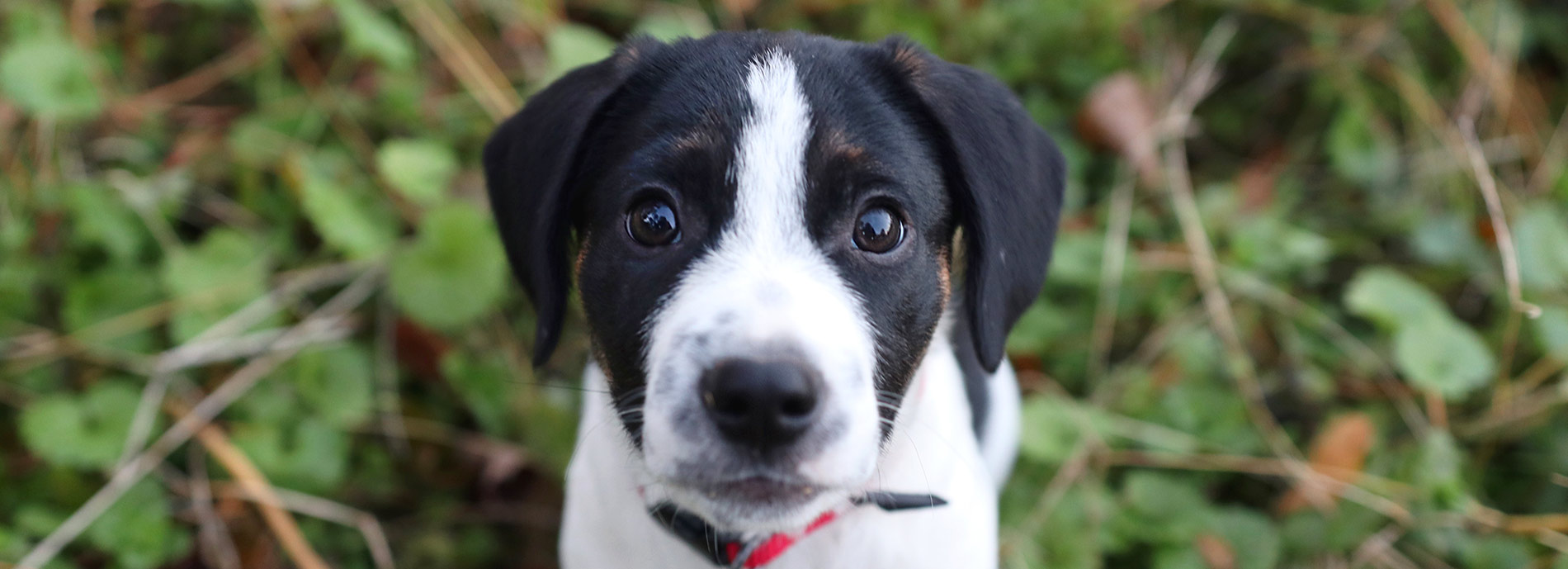Enrichment & Training: Happy Puppy Guide
Below is our guide to help puppies under 6 months of age with general management, socialization, learning basic manners, and learning bite inhibition.
Training Treat Suggestions
![]()
Kibble
![]()
Low-fat, low-sodium cheese sticks
![]()
Boiled chicken
![]()
Peanut butter
![]()
Unsweetened greek yogurt
![]()
Hot dog
Note: Treat portions should be no larger than a half inch in diameter. If the puppy is a small breed dog, treats should be no larger than a quarter inch in diameter. A tablespoon of wet food like peanut butter or unsweetened yogurt goes a long way!
Sleep
Puppies need between 16 and 20 hours of sleep per day. They should be getting this through short naps throughout the day and a longer period of rest at night. Depending on their age, your puppy may get up once or twice each night to potty. When putting a puppy to bed or down for a nap, follow the tips below to help them get the sleep they need.
![]()
5-Minute Rule
For every month of age, a puppy can have up to 5 minutes of exercise per play session. For example, if you have a 2-month-old puppy, they can play for about 10 minutes before needing downtime.
![]()
Exhaustion
If the puppy is barking at his toys, gnawing on your arm and hands instead of a chew toy, or barking excessively, they are deep into the exhaustion stage. Next time, put them to bed with an appropriate chew toy 5-10 minutes earlier.
Potty Training
The key to potty training is to prevent unwanted behaviors from the beginning. Until the puppy is reliably potty trained (i.e., no accidents for at least one month) and listens to sit, down, and come, they should not be given total access to the house. Always remember to supervise your puppy and puppy-proof the room by removing objects that can be chewed on or ingested.
Indoor Leashing
Use the leash around the house to set the puppy up for success for going outside. You can also tie the leash to your body while walking around to help get the puppy used to walking with you. You can also tie the leash to a heavy piece of furniture with access to toys and their bed during supervised play time or quiet time to get them used to staying in one place. A puppy can stay crated for the number of hours they are months old, plus one. So a 2-month-old puppy can stay crated for up to 3 hours.
Exercise
Puppies under 6 months of age do not need rigorous exercise or long walks. In fact, long walks can hurt the puppy’s growing body! High energy puppies sometimes make us think that they need more exercise, but it’s actually not the best thing for them. Limit play time and exercise to short walks and multiple play sessions throughout the day. Don’t forget to fit in plenty of naps!
Alone Time
Having the puppy beside you every moment that you are home can cause over-dependence or distress when left alone. Encourage the puppy to entertain themselves and learn to be alone to prevent future anxiety and stress.
Practice “Alone Time” While You’re At Home
![]()
Place puppy in their crate or play pen with an appropriate chew toy.
![]()
Prepare a meal, read a book, or watch television to help the puppy get used to you being away from them.
![]()
Once you’re done, let them out to potty and play!
Do Not Disturb: Have your puppy nap in a confined space such as a crate or dog bed that is secluded and away from the action. You can also play relaxing music to help with noise cancellation in a busy household.
Bite Inhibition
The time that a puppy spends with its mother and littermates is invaluable and irreplaceable. During the first 2-3 months, the puppy learns how to interact socially with other dogs and how to appropriately use their mouths. As they transition into our homes, it becomes our responsibility to teach them appropriate mouthing behavior.
Toys
Fill your home with plenty of appropriate chew toys. These items are important for providing teething relief and can be used to re-direct mouthy behavior.
Sample Schedule for a 3 or 4-month-old Puppy
| Time | Event |
| 8 a.m. | Wakes up and goes to the bathroom |
| 8:15 a.m. | Eats and drinks water, then goes to the bathroom |
| 8:30 a.m. | 20-minute play time, then goes to the bathroom |
| 9 – 11 a.m. | Puppy naps in crate or play pen |
| 11 a.m. | Puppy wakes up, then goes to the bathroom |
| 11:15 a.m. | Drinks water, plays for 20 minutes, then goes to the bathroom |
| 11:30 a.m. – 1:30 p.m. | Puppy naps in crate or play pen |
